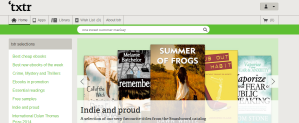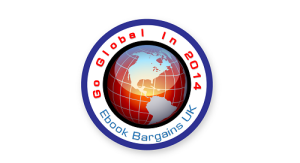
We all know the ebook market is going global. But for most indie authors it seems we’re still partying like it’s 2009. Many of us are still exclusive with one store, or in so few other outlets that we may as well be.
Meanwhile that international ebook market just keeps getting bigger and bigger.
So just how many global ebook stores can we indie authors get our ebooks into without taking out a second mortgage and busting a blood vessel?
How does over 300 sound?
~
Amazon has eleven Kindle sites, but readers in Ireland, Belgium, Monaco, St. Marino, Switzerland, Austria and New Zealand can buy from neighbouring Kindle stores without surcharges, as can South Africans. So effectively nineteen outlets covered there.
NB In theory many other countries (by no means all – over half the world is blocked totally) can buy from AmCom, but sending readers to Amazon US only to be surcharged will reflect badly on the author, as readers won’t know that the $2+ surcharge (even on “free” ebooks!) goes to Amazon, not to you. For that reason we’re counting just the above-mentioned countries for Amazon.
f you are with Apple you can add another 51 countries to the list. Apple is the second largest ebook distributor by dedicated-country reach. Extensive coverage of North America, Latin America and Europe. Not so hot in Asia or Africa.
Nook is kind of in limbo right now. Apart from the US Barnes & Noble store and Nook UK (a reminder: it’s NOT called B&N in the UK) there are another thirty or so countries served by Nook with a Windows 8 app.
At some stage they will all become fully fledged stores, maybe, but for now, let’s discount those and just add the two key Nook stores to the list.
19 Amazon stores, 51 Apple stores and 2 Nook stores means you already have easy access to 72 global ebook stores.
If you are with Kobo then in theory you’ll be in the localized Kobo stores in US, Canada, Australia, Japan, South Africa, India, UK, Netherlands, Germany, France… You’ll be in Kobo partner stores like Bookworld, Collins, Angus & Robertson and Pages & Pages in Australia, in PaperPlus in New Zealand, in National Book Store in the Philippines, in Crossword in India, in Indigo in Canada, in Fnac in France and Portugal, in Mondadori in Italy, in Livraria Cultura in Brazil, and probably a few more that aren’t springing to mind right now.
Okay, so twenty-two more retail outlets right there, taking you up to 92.
Then there’s the Indiebound stores. Indiebound is a Kobo partner project whereby bricks and mortar indie stores have a Kobo ebook store integrated with their website. As an example, checkout Poor Richard’s in Kentucky. Or The Velveteen Rabbit Bookshop & Guest House in Wisconsin. Or Octavia Books in New Orleans.
We haven’t done a full appraisal of all of the Indiebound stores yet (soon!), but there are well over FOUR HUNDRED b&m indie bookstores selling ebooks via Kobo. Some just send you to the main Kobo store. Others have a fully integrated ebook store as part of their website.
We discount the first lot here and just include those with an integrated Kobo store. Let’s play safe and say there are, very conservatively, just 50 integrated Indiebound stores with your ebooks in (more likely well over 200!).
Suddenly we’re looking at 142 retailers with your ebooks in.
If you are in ‘txtr that’s another twenty stores right now, and with six more in Latin America about to open.
162 global retail stores.
If you are with Smashwords then as well as ‘txtr you ought to also be in Blio and Versent, and in the Indian megastore Flipkart.
Bookbaby will also get you into Blio and Flipkart, and if you are with Bookbaby you can be in eSentral. E-Sentral is based in Malaysia but also has stores in Singapore, Indonesia, Vietnam, the Philippines, Thailand and Brunei.
Bookbaby will also get you into Ciando, one of the key retail outlets in Germany. And as per this link – http://www2.ciando.com/ – the Ciando ebook store in Germany is in English!
For those who haven’t been keeping count that’s 173 global ebook retailers.
Throw in All-Romance and OmniLit, which is free-access, to make that 175.
American and British indies often don’t look beyond Smashwords and D2D, and maybe Bookbaby, totally ignoring the free-access aggregators in Europe like Xin-Xii and Narcissus. We do so at our peril.
Xin-Xii will get you into the seven key Tolino Alliance stores (Hugendubel, Weltbild, Thalia, etc) that devastated Amazon market share last year. Essential places to be if you want to make it in Germany.
But Xin-Xii will also get you into Donauland in Austria, Casa del Libro in Spain, Family Christian in the US, Otto in Germany, and Libris in the Netherlands. It will also get you in the ebook stores of the mobile phone operators O2 and Vodafone.
Lost count yet? We’re talking 189 global ebook stores already.
So let’s see if Narcissus can push us over that 200 mark. Narcissus is based in Italy, and little known outside, but it a gem of an aggregator.
Quite apart from many of the stores already covered above, Narcissus will also get you in Ultima, in LaFeltrinelli, in IBS, in Net-Ebook, in Libreria Rizzoli, in Cubolibri, in Book Republic, in Ebookizzati, in DEAStore, in Webster, in MrEbook, in Ebook.it, inLibrisalsus, in Libreria Fantasy, in The First Club, in Omnia Buk, in Il Giardino Dei Libri, in CentoAutori, in Excalibooks, in Hoepli, in San Paolo Store, in Libramente, in Ebook Gratis, in Libreria Ebook, in Byblon Store, in Libreria Pour Femme, as well as numerous specialist and academic stores. Narcissus also distribute to Nokia. Yes, as in the phone company. Ebooks are still widely read on Feature phones, and Nokia leads the way.
But just those 26 examples from Narcissus take us to 215 global ebook stores.
And then there’s Google Play. You can go direct to Google Play or free (pay as you sell) through Narcissus.
Google Play have 57 global ebook stores (and more on the way).
Which takes us up to 272 ebook stores. And counting.
On top of this we can add the ebook subscription services like Oyster (US only) and Scribd (global), accessible through Bookbaby, Smashwords and (in the case of Scribd) D2D.
Then there’s digital libraries. Even leaving aside the as yet unresolved mess that is the Smashwords-OverDrive saga, indies with Smashwords or Bookbaby may be in libraries through Baker & Taylor.
Bookbaby also distribute to the wholesale catalogues Copia and Gardners, which supply libraries and also a ton more retail stores over and above those listed above.
Throw in the Copia and Gardners outlets and we EASILY cross the 300 retailer mark.
Remember, ALL these are accessible free of charge (you pay a percentage per sale).
There are other options, like Vook. IngramSpark and Ebook Partnership, which would substantially add to this list, but these options either have up-front costs or offer a very poor percentage return for free-access.
But worth noting that players like Ebook Partnership can get you not just into the OverDrive catalogue, which means an appearance in key stores like Books-A-Million, Waterstone’s, Infibeam, Kalahari and Exclus1ves, as well as the myriad OverDrive library partners, but also other key up and coming outlets like Magzter, like Bookmate in Russia, and so on and so on.
~
The global ebook market is growing by the day. There are huge new markets opening up in Latin America, in India, in China, and across SE Asia right now that most indies are not a part of.
In the near future Africa will take a big leap forward as retailers make ebooks accessible to the hundreds of millions of Africans currently locked out of our cozy ebook world.
Make no mistake. The global ebook market will dwarf the US ebook market many, many, many times over as it gains momentum.
No, there won’t be many overnight successes, yes it will take time, and yes it will require a good few hours of effort to make sure you are in all these stores in the first place.
Sorry. There are no magic wands to wave. No just-add-water instant solutions.
No pain, no gain.
But you only have to upload to these stores once, and a handful of aggregators can do most of them for you in a couple of rounds, planting the seeds for future harvests. Then you just need to pop back now and again to tend the garden. It’s a one-off effort now that will pay back over a life-time as these global markets take off.
That list of 300+ stores above is just going to grow and grow and GROW as market fragmentation and international expansion gather momentum. The global ebook market has barely left the starting line!
The savvy indie author thinks about the next five years, not the next five days. Don’t get lost in the minutiae of your every-day ebook life and miss the bigger picture here.
Because we are all privileged to be part of something that is way, way bigger than just selling our books. We are witnessing – participating in – the early stages of a New Renaissance quite unparalleled in human history.
A New Renaissance on a global scale that will not just make accessible existing art forms to every single person on the planet, but will create new art forms as yet unknown, but in which we can be sure writers will play a key role.
Be part of it.
 It seems Smashwords have now dropped the incredibly annoying requirement that you had to put “Published by Smashwords” or some similar text on the title page of your ebook when submitting for Premium distribution.
It seems Smashwords have now dropped the incredibly annoying requirement that you had to put “Published by Smashwords” or some similar text on the title page of your ebook when submitting for Premium distribution.




